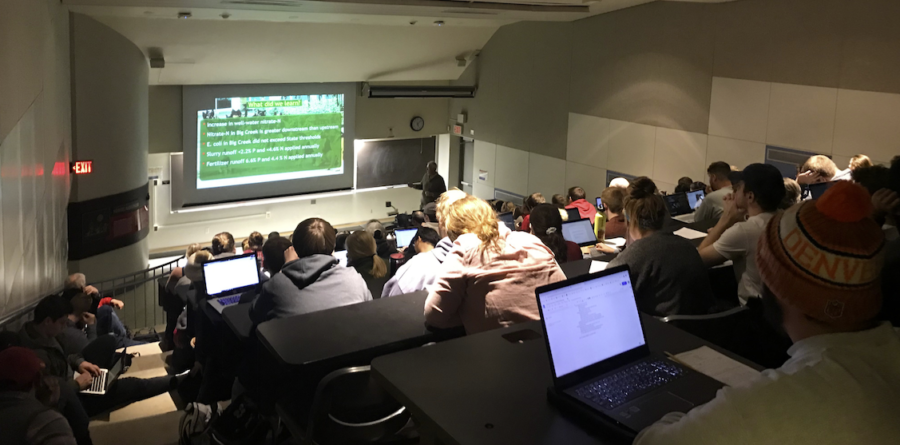Lecturer presents agriculture research on phosphorus
The 2050 room of Agronomy Hall filled to capacity for a lecture presenting the effect of phosphorus on water.
December 10, 2019
Research around the cycling of phosphorus in soil-plant-water systems was discussed at a Tuesday lecture in a room full of people in Agronomy Hall.
Andrew Sharpley, distinguished professor of soils and water quality at the University of Arkansas, visited Iowa State to speak at the 2019 William H. Pierre Lecture in Soil Science titled “Agricultural Phosphorus and Food-Energy-Water Security.”
Sharpley is an international authority for assessing, managing and remediating the impacts agricultural management can have on soil and water resources.
The lecture began with Sharpley providing a background of how soil affects water quality including aspects of soil erosion and the production of algae in the water from soil runoff. Some ways the water can be affected by soil is due to the phosphorus element.
Phosphorus is needed by plants in order to grow and it is a part of human’s DNA, Sharpley said.
“So farmers have to apply it,” Sharpley said. “[…] Phosphorus sticks to [soil] and the plants can’t get it, they can’t see it. So it means that farmers need to apply fertilizer.”
The soil with the applied fertilizer can then runoff into nearby bodies of water. Sharpley compared it to a garden at home when it rains. Sometimes lawn clippings will wash from the garden without being seen.
“Where it’s on the land and it’s great to make plants grow, it also makes plants grow in water, algae, which can be a problem,” Sharpley said. “And the part that makes it more of a concern is that you do not need as much P or phosphorus in water to make a plant or algae grow as you do need to make a crop grow. Water plants are much more sensitive, they need much less — a little bit goes a long way.”
Throughout his research on the effect of phosphorus, Sharpley has had the chance to work with farmers and have conversations with them, which he said has been beneficial for him.
While it is not always possible, involving farmers can be an important part of agriculture research.
“Involve them at the beginning of the process rather at the end of it, in the planning,” Sharpley said. “If you get them on board in understanding, at least seeing the logic, they’re more likely to accept the logic of the results, they feel like they’re being considered.”
Sharpley discussed the matter of conservation and how treating the management of it as a type of human health could help to make people aware of it. If the information about conservation is presented almost like a human sickness, it may catch the attention of more people.
Finding the cause of what is affecting the water was emphasized by Sharpley. He said each site should be comprehensively assessed to find the ‘diagnosis.’
After the diagnosis is discovered for a specific water site, it’s time for the researchers to “prescribe the right treatment.” The group studying the water considers the benefits and possible risks of the treatment. Relating to treating this issue like human health, Sharpley said the side effects of the treatment are discussed.
For the future of agriculture research, Sharpley said it is important to make the public more aware of ecosystem health overall. Sharpley also said it’s good to look at the economic side of agriculture research.
“Doing agriculture research is kind of a journey,” Sharpley said. “So you start out in one area and you transition to another, so it’s kind of a longer winded road so the exciting part is that sometimes you don’t know where it’s leading to.”
The William H. Pierre Lecture in Soil Science is named after William H. Pierre, who was an administrator, researcher and leader. Pierre came to Iowa State as the head of the Department of Agronomy in 1938.
Pierre’s work included the effect of nitrogen fertilizers on the pH of soil, which was rewarded with the American Society of Agronomy Nitrogen Research Award in 1931. Research that led him to the pioneer development of methodology for the determination of maximum yield of corn was focused on the effect crops have on soil acidity development.
According to the department of agronomy’s website, “this lecture is a fitting reminder of Dr. Pierre’s standard of excellence.”







